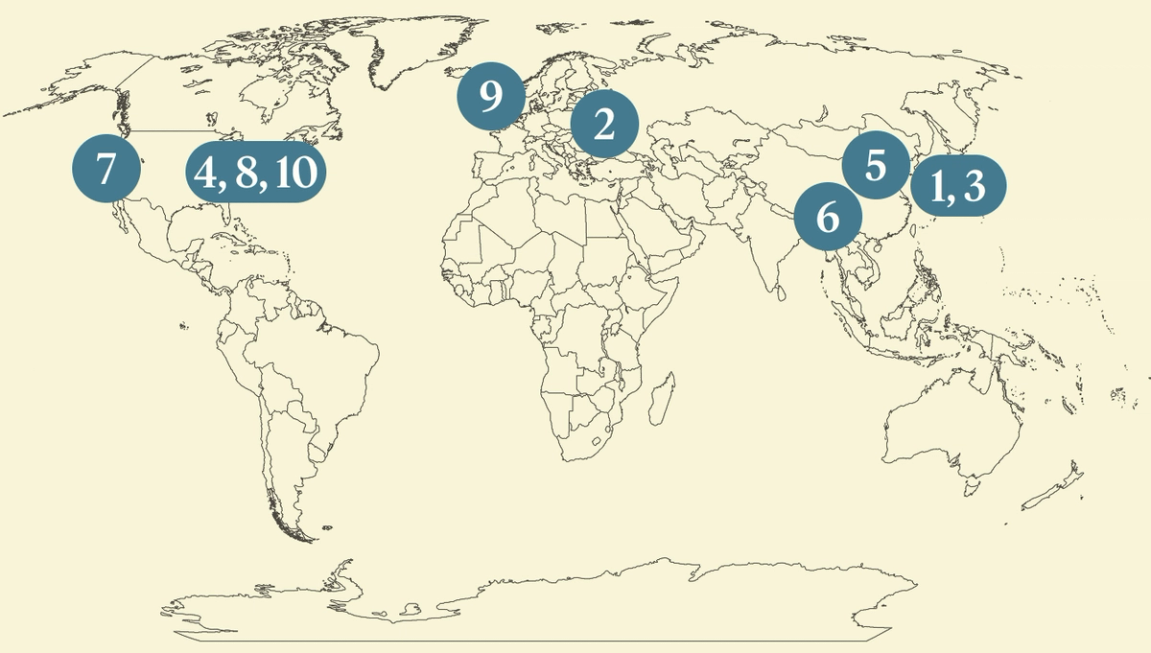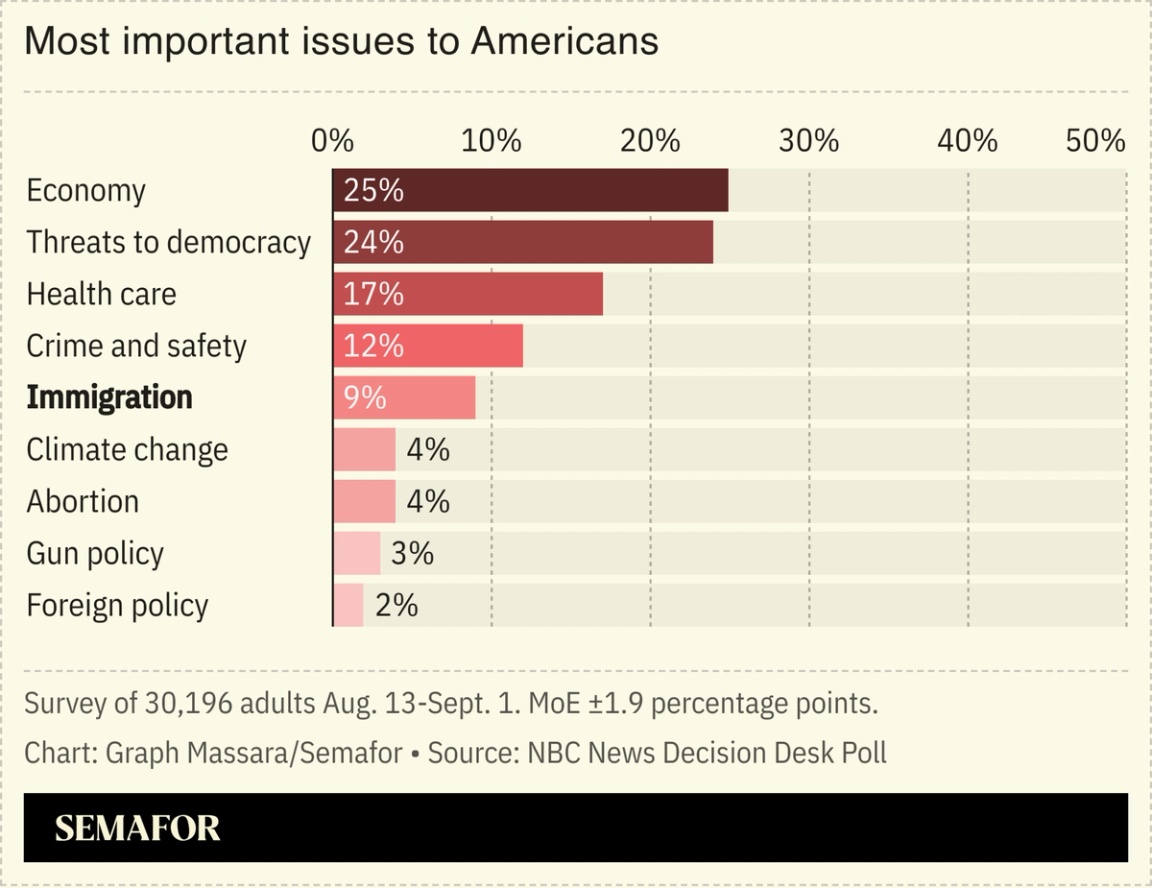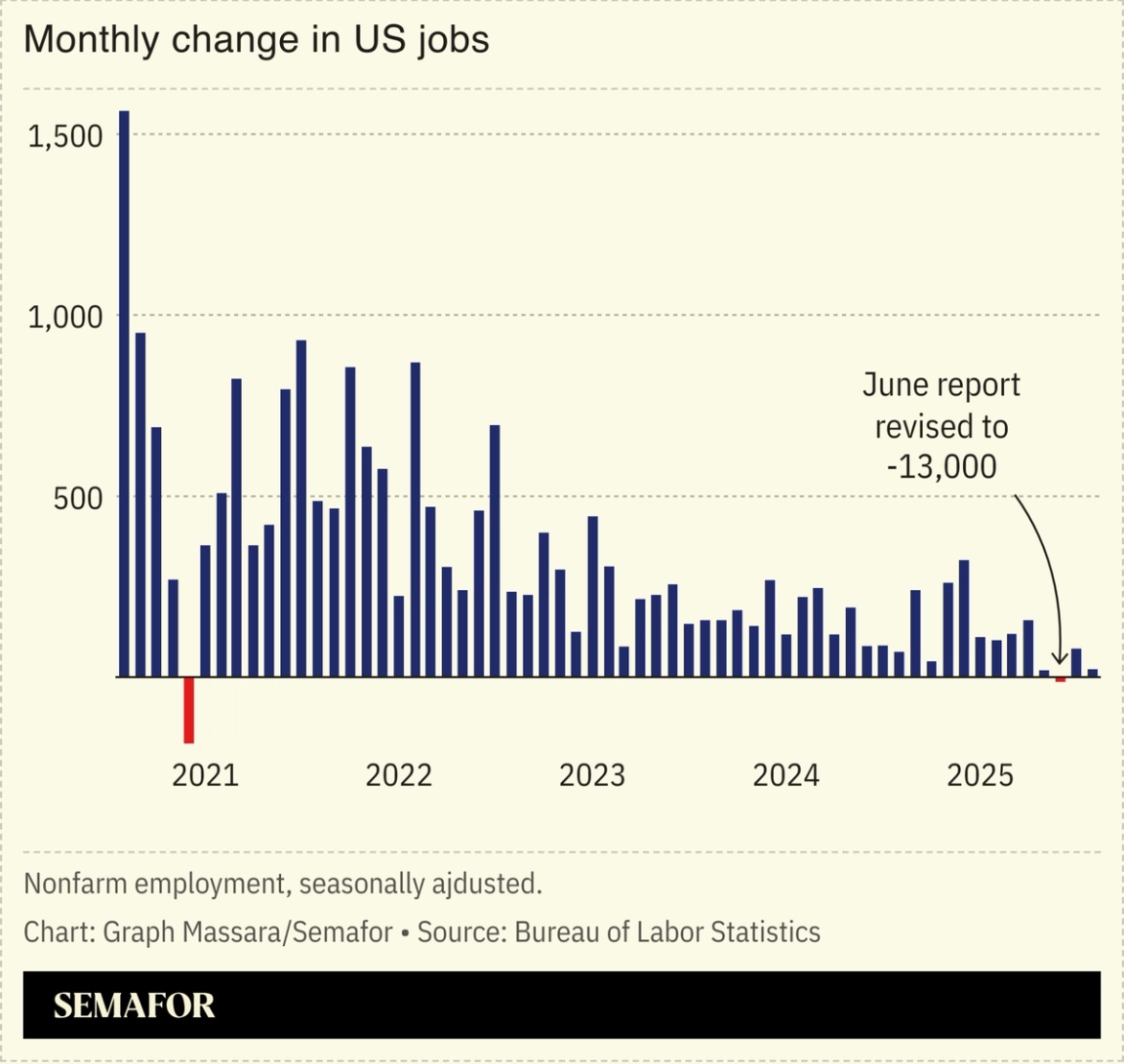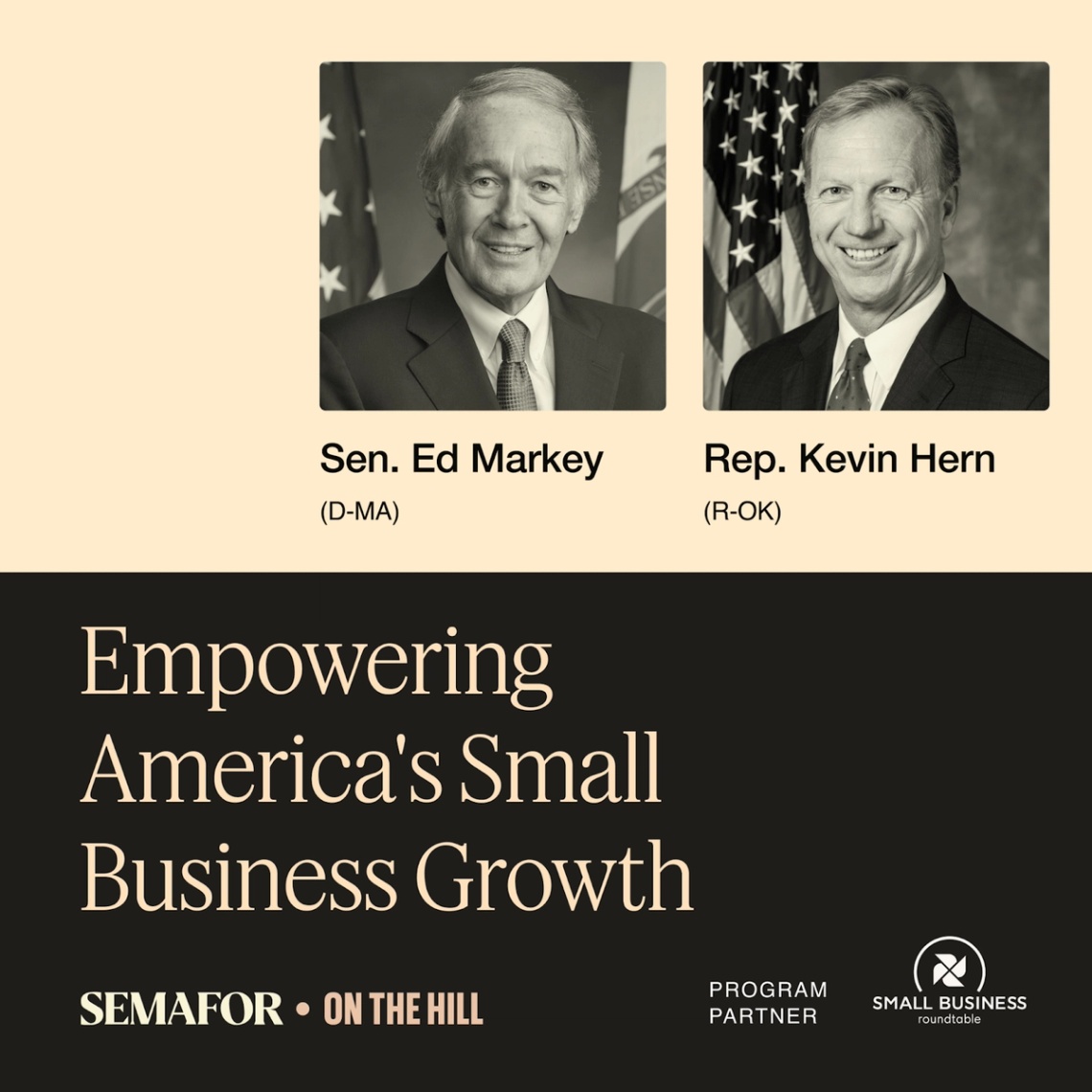| | Japan’s prime minister resigns, South Korea negotiates the release of workers detained in a US immig͏ ͏ ͏ ͏ ͏ ͏ |
| |  | Flagship |  |
| |
|
The World Today |  - Japanese PM resigns
- Massive assault on Kyiv
- SKorean workers detained
- Signs of US stagflation
- Beijing eyes stablecoins
- China’s ‘Dalifornication’
- AI copyright settlement
- Autism-Tylenol report
- Youth mental health fears
- Sin-caraz tennis rivalry
 An exhibition celebrates the artistry of tattooing. |
|
 Toru Hanai/Pool via Reuters Toru Hanai/Pool via ReutersJapanese Prime Minister Shigeru Ishiba resigned on Sunday, bowing to internal party pressure after a poor performance in July legislative elections. Ishiba’s abrupt announcement — he has been in the job less than a year — comes days after Tokyo finalized a trade deal with Washington setting 15% tariffs on Japanese exports to the US. During his tenure, Ishiba grappled with a sluggish economy, high inflation, and trade turmoil, Nikkei wrote, none of which he managed to fully resolve. Japanese markets are braced for more volatility: Long-term bond yields have been hovering near record highs, and analysts believe Ishiba’s successor could shepherd a return of “Abenomics” with ultra-loose monetary policy and fiscal stimulus. |
|
Russia launches largest attack of war |
 Gleb Garanich/Reuters Gleb Garanich/ReutersRussia struck a Ukrainian government building for the first time since its 2022 invasion. The aerial Russian assault on Sunday was the largest of the conflict. Drones also hit residential buildings in Kyiv; Ukraine’s president called the attack “vile.” With ceasefire efforts stalled, the war has become “a contest between two hourglasses,” The Wall Street Journal wrote: One measures how long Kyiv’s army can last, and the other how long Moscow’s economy can hold up. Russian President Vladimir Putin is bullish on the latter, “allowing him to impose a victor’s terms” on peace negotiations. On Friday, Putin said any Western troops in Ukraine would be considered “legitimate targets for defeat.” |
|
SK workers released after US raid |
 Seoul on Sunday said hundreds of South Korean workers detained by US immigration authorities will be flown back to Korea, after days of tense negotiations with Washington. The workers were arrested on Thursday in a sweeping operation at a Georgia battery plant, sparking “visceral” condemnation from Korean media, one Seoul-based journalist said. The raid highlighted a “fundamental contradiction: the US demanding massive foreign investment while making it practically impossible to bring necessary skilled workers through proper visa channels,” he wrote. Analysts noted another point of tension: US President Donald Trump is trying to revive American manufacturing while also cracking down on immigration, as the White House vows to execute more workplace raids. |
|
Weak US jobs data raises slowdown fears |
 The latest dismal US jobs report has raised the specter of stagflation even as it solidifies the case for the Federal Reserve to cut interest rates next week, analysts said. The report comes after analysts — and some Fed officials — for months have debated whether the central bank has waited too long to cut rates, risking a recession. Health care and artificial intelligence have propped up the economy, but the new report showed just how much other sectors have suffered: It “screams impending recession,” journalist Derek Thompson wrote. The economy is “flashing yellow,” a former labor official told the Financial Times, posing a political challenge for US President Donald Trump, who campaigned on bringing costs down. |
|
 Tyrone Siu/Reuters Tyrone Siu/ReutersStablecoins could present the next battleground in the US-China rivalry. Beijing appears to be using Hong Kong as a testing ground for cryptocurrencies pegged 1:1 to fiat currencies with new legislation to regulate the coins. China has long restricted digital currencies, but most stablecoins are tied to the US dollar, and officials in Beijing “do not want to miss an opportunity to influence the next generation of global payments,” The New York Times wrote. As China looks to further challenge the dominance of the dollar, “the objective here is to stay relevant as a belligerent White House seeks to weaponize its control of the global financial flows,” Bloomberg’s Andy Mukherjee wrote. |
|
Low-income Chinese traveling more |
 Florence Lo/Reuters Florence Lo/ReutersA tourist boom at an inexpensive lakeside Chinese town reflects broader shifts in the country’s economy. The southwestern city of Dali, nicknamed “Dalifornia,” has a reputation as a laid-back backpackers’ destination, but this summer feels busier than usual, The Economist wrote. That’s because lower-income people in China are traveling more — despite a slowdown in spending fueled by China’s property crisis. But while consumer sentiment in China’s biggest cities remains in the doldrums, people living in smaller, poorer areas seem more upbeat, and willing to spend more of their disposable income. Convincing more people “to part with excess savings could help unlock consumer demand and give the economy a much-needed boost,” the outlet noted. |
|
Anthropic settles copyright suit |
 Yves Herman/Reuters Yves Herman/ReutersArtificial intelligence startup Anthropic agreed to pay book authors $1.5 billion to settle a landmark copyright suit over the training of its AI model, Claude. Anthropic’s offer came after a judge earlier this year decided the startup illegally downloaded pirated books on the internet. The settlement, the largest in copyright case history, could have wide-ranging implications for other AI companies facing similar legal challenges, analysts said. OpenAI has been sued by authors over the training of its large language model; another group sued Apple on Friday alleging copyright violations. “This indicates that maybe for other cases, it’s possible for creators and AI companies to reach settlements without having to essentially go for broke in court,” a legal analyst said. |
|
 From local shops to global sellers, small businesses remain engines of vital growth. And as they face rising costs, labor shortages, and shifting regulations, they’re leveraging technological breakthroughs, market changes, and the evolving policy landscape to compete on a bigger scale. Join Semafor this week, Wednesday, Sept. 10 as Sen. Ed Markey (D-MA), Rep. Kevin Hern (R-OK), Karen Kerrigan, and small business executives explore how businesses are embracing their digital potential, tackling competition in 2025, and reaffirming their role as a driving force in the US and global economy. |
|
US health dept. to link autism, Tylenol |
 Jonathan Ernst/Reuters Jonathan Ernst/ReutersThe US health department plans to link autism and Tylenol use during pregnancy in an upcoming report, The Wall Street Journal reported. The agency confirmed it is working on a report to be released later this month, but did not share its conclusions. Shares in the company that makes Tylenol — a popular brand of acetaminophen — fell 10% on the news. There’s no evidence that taking acetaminophen while pregnant causes autism: The largest study to date, published in 2024, found no such link. Health Secretary Robert F. Kennedy Jr. in April promised to find the cause of autism by September; the scientific consensus, based on decades of research, is that autism is complex and has no single cause. |
|
Are the kids actually alright? |
Psychologists are increasingly questioning the popular theory that young people categorically have worse mental health. A recent scientific review found evidence of a small rise in depression and anxiety over the last 40 years, and a decline in aggression and impulsivity — overall the level of reported problems was unchanged. The authors argued that today’s youth have no worse mental health than past generations, but “subtly different patterns of difficulties.” Another researcher argued that a recent Financial Times analysis suggesting young people’s conscientiousness had cratered in the last decade was the product of “tortured” data and that any decline, if real, was likely small and — contrary to the FT’s argument — unlikely to do with social media. |
|
Alcaraz wins US Open men’s title |
 Mike Segar/Reuters Mike Segar/ReutersSpain’s Carlos Alcaraz defeated world tennis No. 1 Jannik Sinner of Italy to win the US Open men’s singles title Sunday. The three-hour, four-set match solidified Sinner and Alcaraz as leaders of a new generation of tennis superstars: The two have faced off in three successive Grand Slam championships, with 2025 being |
|
|